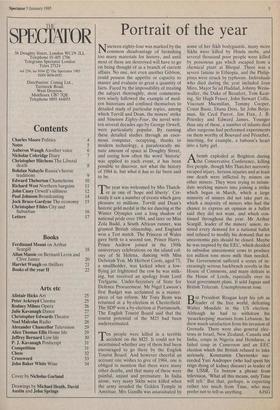Portrait of the year
Nineteen eighty-four was marked by the 111 common disadvantage of furnishing too many materials for history, and until most of these are destroyed will have to go on being thought of as a branch of current affairs. No one, not even another Gibbon, could possess the appetite or capacity to master and evaluate so great a quantity of facts. Faced by the impossibility of treating the subject thoroughly, most commenta- tors wisely followed the example of mod- ern historians and confined themselves to detailed study of particular topics, among which Torvill and Dean, the miners' strike and Nineteen Eighty-Four, the novel writ- ten several decades ago by George Orwell, were particularly popular. By running these detailed studies through an enor- mous computer, occupying, thanks to modern technology, a paradoxically mi- nute amount of space at Doughty Street, and seeing how often the word 'historic' was applied to each event, it has been possible to discover, not what the history of 1984 is, but what it has so far been said to be.
The year was welcomed by Mrs Thatch- er as one of 'hope and liberty'. Cer- tainly it saw a number of events which gave pleasure to millions. Torvill and Dean's historic gold medal in the ice dancing at the Winter Olympics cast a long shadow of national pride over 1984, and later on Miss Zola Budd, a South African runner, was granted British citizenship, and England won a Test match. The Princess of Wales gave birth to a second son, Prince Harry. Prince Andrew joined in the 150th anniversary celebrations on the island col- ony of St Helena, dancing with Miss Deborah Yon. Mr Herbert Coots, aged 73, a smallholder, was kicked when a low- flying jet frightened the cow he was milk- ing, but received an apology from Lord Trefgarne, Under-Secretary of State for Defence Procurement. Mr Nigel Lawson's first Budget was acclaimed as a master- piece of tax reform. Mr Tony Benn was returned at a by-election in Chesterfield. The SDP won a by-election at Portsmouth. The English Tourist Board said that the tourist potential of the M25 had been underestimated.
Ten people were killed in a terrible accident on the M25. It could not be ascertained whether any of them had been encouraged to go there by the English Tourist Board. And however cheerful an account one wishes to give of 1984, one is obliged to mention that there were many other deaths, and that many of these were painful, unjust and premature. In India alone, very many Sikhs were killed when the army invaded the Golden Temple in Amritsar, Mrs Gandhi was assassinated by
some of her Sikh bodyguards, many more Sikhs were killed by Hindu mobs, and several thousand poor people were killed by poisonous gas which escaped from a chemical plant at Bhopal. There was a severe famine in Ethiopia, and the Philip- pines were struck by typhoons. Individuals who died during the year included Joan Miro, Major Sa'ad Haddad, Johnny Weiss- muller, the Duke of Beaufort, Tom Keat- ing, Sir Hugh Fraser, John Stewart Collis, Viscount Macmillan, Tommy Cooper, Count Basic, Diana Dors, Sir John Betje- man, Sir Cecil Parrot, Jim Fixx, J. B. Priestley and Edward James. Younger than any of these, a number of infants died after surgeons had performed experiments on them worthy of Bouvard and Pecuchet, inserting, for example, a baboon's heart into a baby girl.
Abomb exploded at Brighton during the Conservative Conference, killing five people, though Mrs Thatcher narrowly escaped injury. Serious injuries and at least one death were inflicted by miners on other miners. They were trying to intimi- date working miners into joining a strike which began in March, which a large minority of miners did not take part in, which a majority of miners who had the chance to express an opinion in a ballot said they did not want, and which con- tinued throughout the year. Mr Arthur Scargill, leader of the miners' union, re- sisted every demand for a national ballot and refused to modify his demand that no uneconomic pits should be closed. Maybe he was inspired by the EEC, which decided to subsidise uneconomic cows to produce ten million tons more milk than needed. The Government suffered a series of in- creasingly serious backbench revolts in the House of Commons, and many defeats in the House of Lords, especially over its local government plans. It sold Jaguar and British Telecom. Unemployment rose.
But President Reagan kept his job as leader of the free world, defeating Walter Mondale in the US election. Although he had to withdraw his 'peacekeeping' marines from Lebanon, he drew much satisfaction from his invasion of Grenada. There were also general elec- tions in Israel, New Zealand, Canada and India, coups in Nigeria and Honduras, a failed coup in Cameroon and an EEC election which the British refused to take seriously. Konstantin Chernenko suc- ceeded Yuri Andropov (who had spent his reign dying of kidney disease) as leader of the USSR. To borrow a phrase from television, 'What all this means, only Time will tell.' But that, perhaps, is expecting rather too much from Time, who may
prefer not to tell us anything. AJSG






































 Previous page
Previous page